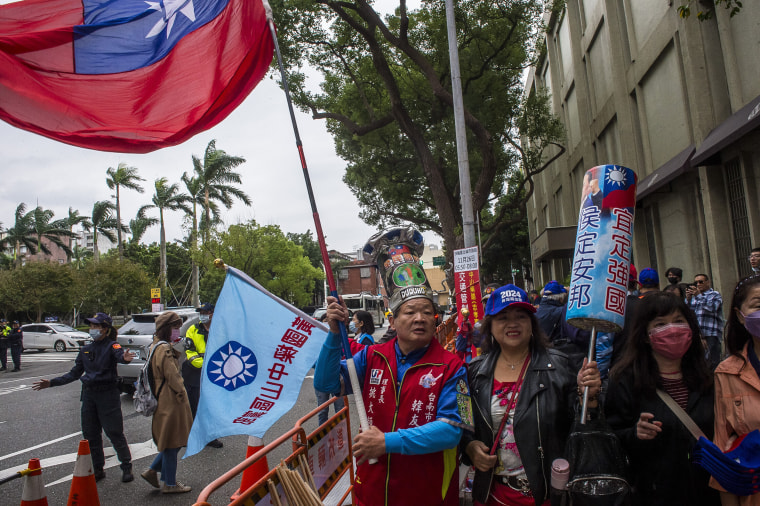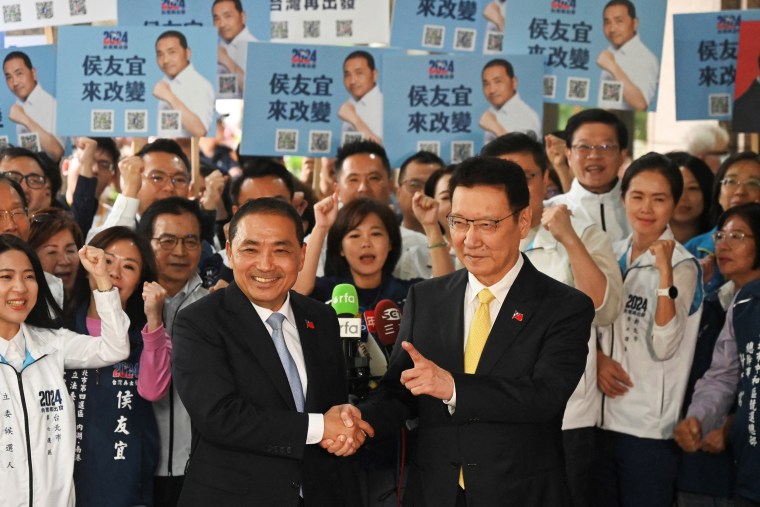TAIPEI, Taiwan — Taiwan’s opposition parties, which seek closer China ties, registered separate presidential candidates on Friday after a dramatic split, potentially easing the way for the governing party, which has defied Beijing’s pressure, to stay in power.
The Jan. 13 election is taking place as China, which views Taiwan as its own territory, steps up military and political pressure to force the island to accept its sovereignty claims.
The opposition Kuomintang (KMT) and much smaller Taiwan People’s Party (TPP), both campaigning to forge better ties with China, had agreed to work together against the governing Democratic Progressive Party (DPP) but made no progress on plans for a united presidential ticket.
China, which has framed the election as a choice between “peace and war,” believes the DPP and its presidential candidates are dangerous separatists and has rebuffed offers of talks.
Late Thursday, the KMT walked out of last-ditch talks with the TPP held in front of reporters in a hotel conference room and shown live on television, after failing to reach agreement.
The talks were brokered by the billionaire founder of major Apple supplier Foxconn, Terry Gou, who had been running as an independent candidate.
In one of the most dramatic moments, the KMT’s presidential candidate, Hou Yu-ih, read a private text message from TPP candidate Ko Wen-je in which Ko said Gou needed to “find a reason” to drop out of the presidential race.
Hou and Ko both announced their running mates on Friday morning — Hou choosing the fiery media personality Jaw Shaw-kong, while Ko from the much smaller TPP selected one of its lawmakers, Cynthia Wu, whose family is a major shareholder of conglomerate Shin Kong Group.

Gou, who was widely expected to withdraw from the race to be president after the opposition talks collapsed, confirmed he was doing so just three hours before the deadline to register his candidacy with the election commission.
Hou, introducing Jaw, pledged to bring “stability to the Taiwan Strait and safety to Taiwan, which will assure the entire world.”
By contrast with the chaos in the opposition camp, a united DPP has been charging ahead in its election campaign, registering its presidential and vice presidential candidates on Tuesday.
Huang Kwei-bo, a professor of diplomacy at Taipei’s National Chengchi University and a former KMT deputy secretary general, said the opposition would hope for “favorable changes” they can seize on before election day such as internal DPP scandals.
“There will be a big uphill battle for the two opposition parties,” he told Reuters.
The DPP’s Lai Ching-te, Taiwan’s vice president, has consistently led in the polls.
His campaign team on Friday called on the opposition to “quickly submit detailed policies” so the election can “return to normality.”
Speaking at an election event late Thursday, Lai talked about his team’s busy schedule, discussing policy with voters and the media, and poured scorn on the opposition’s disunity.
“Should we dare to hand over the business of running the country to these people?” Lai said. “Of course this is not OK.”
But he said he was not resting on his laurels despite the opposition’s disunity, mentioning the 11 events he had attended that day.
“Is this getting elected while lying down?” Lai added, referring to previous comments by opposition politicians that their failure to unite would ensure Lai’s easy victory.
